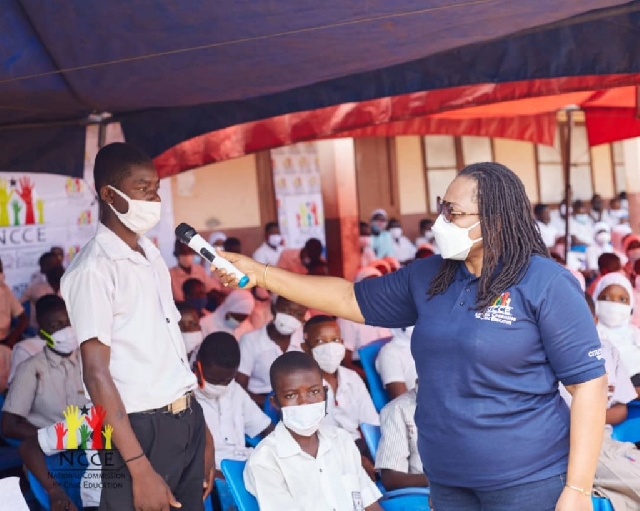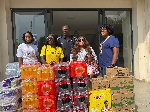Play active roles in keeping Ghana clean – NCCE boss
 NCCE Boss Josephine Nkrumah with the microphone
NCCE Boss Josephine Nkrumah with the microphone
The Chairman of the National Commission for Civic Education (NCCE), Ms Josephine Nkrumah has observed that the challenge the country faces with regards to plastic waste could be curtailed if we all play our active roles to address the menace.
She challenged children to play their respective roles to contribute in their little ways to ensure a clean environment, adding that “as children, you are not too young to make a change.”
She threw the challenge to the pupils of Zobzia Junior High School at Gambaga, in the North East Region during the Citizenship Week Celebration at the School.
Commenting on the long years it takes plastics to decompose, Ms Nkrumah amplified the need for every Ghanaian to reduce the single-use of plastic in their day-to-day activities and resort to alternative eco-friendly materials that do not endanger our environment.
She demonstrated responsible ways by which the pupils could reduce plastic bags in their day to day activities and urged them to carry bowls and cups for food.
Concerning the indiscriminate littering of plastics in various towns and cities, the NCCE boss strongly advocated a responsible disposal mechanism, and recycling regime of these plastics to safeguard the environment.
“The plastics according to scientists take over 400 years to decompose in the soil, which means we have to be more responsible in the way we use and dispose of them,” she added.
She stated that keeping a clean environment is an act of good citizenship captured under Article 41 (k) of the 1992 Constitution, and encouraged the pupil to be change-makers in protecting and preserving the environment.
Ms Nkrumah touched on the galamsey menace, noting that “we cannot continue to use unstainable and inappropriate ways to extract Ghana’s mineral resources that leaves our water bodies and mining sites messy and polluted.”
As a result of these activities, she intimated that it now costs the Ghana Water Company four times more to produce potable water to homes, adding that the situation must stop.
Source: classfmonline.com
Trending News

Okudzeto-Ablakwa inaugurates smart classrooms to boost STEM education in North Tongu
11:38
Activist Felicity Nelson brings Christmas comfort to Accra Police cells
08:32
First batch of large-scale mining licences to face possible revocation revealed
09:08
A/R: Kumawu MP celebrates Christmas with drivers and Okada riders
07:57
Alhaji Agongo builds lifeline facility for Ghana Police Hospital’s ‘unknown patients’
09:55
IGP Special Operations Team arrests suspect in Kpalsi over suspected Indian Hemp
07:48
Police arrest 2 suspects for unlawful possession of ammunitions
10:06
Kumawu MP shares Christmas with aged, widows in Constituency
07:39
PRINPAG President loses father
08:26
WN/R: Two school staff members arrested for theft of students' food items at Sefwi Bekwai
02:13



